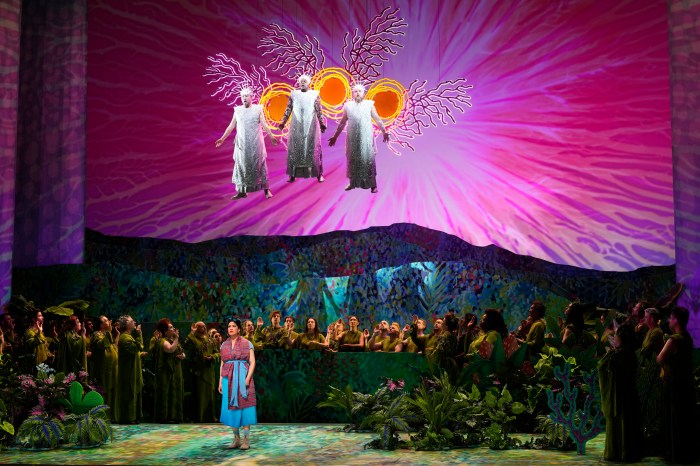
If you go: “A Strange Loop” runs through July 7 at Playwrights Horizons. 416 W. 42nd St., playwrightshorizons.org.
Self-loathing spills into unadulterated self-indulgence and confessional self-therapy in “A Strange Loop,” an abstract, academic, semi-autobiographical monologue-turned-musical about a 25-year-old black, gay, overweight, depressed musical theater writer, which is receiving its world premiere Off-Broadway at Playwrights Horizons.
It has book, music, lyrics and vocal arrangements by Michael R. Jackson, an undisputedly talented and promising young artist who holds multiple degrees in dramatic writing and has received numerous awards and commissions. The production is directed by Stephen Brackett (“Be More Chill”).
Larry Owens (big-voiced, vulnerable and pouty) plays Usher, who (like the show’s author) shares the name of a famous pop star. On top of that, Usher works on the side as an usher at “The Lion King.”
Owens is joined by five men and one woman who play Thoughts 1 through 6, representing numerous figures in his life who pop up in Usher’s head, including his agent, family, potential love interests (both real and imagined), historical figures (Harriet Tubman emerges out of a trap door) and theatergoers during intermission at “The Lion King.”
It is not so different from “A New Brain,” William Finn’s 1998 semi-autobiographical musical about a struggling musical theater songwriter.
In a program note, Jackson defines the term “strange loop” (originally conceived by cognitive scientist and professor Douglas Hofstadter) as “a collection of meaningless symbols mirroring back on their own essences in repetition until death.”
With that in mind, Jackson’s musical certainly does resemble a “strange loop,” full of repeated gestures, complaints and concerns, ultimately culminating in a ridiculous climax (in which Usher attempts to create a Tyler Perry-style gospel drama), breakdown and reboot.
Despite inventive touches, fluid production values and songs full of both spark and sensitivity, “A Strange Loop” ultimately falls victim to the perils of its own design, becoming so repetitive, whiny, creepy and explicit that only the most intrepid theatergoers are not eventually turned off by it.

















